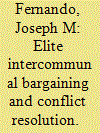|
|
|
Sort Order |
|
|
|
Items / Page
|
|
|
|
|
|
|
| Srl | Item |
| 1 |
ID:
117187


|
|
|
|
|
| Publication |
2012.
|
| Summary/Abstract |
Between 1949 and 1951, the Communities Liaison Committee (CLC), an unofficial body comprising leaders from the main Malayan ethnic communities, served as a prototype for elite intercommunal conflict resolution during a very challenging period amid an ongoing communist insurgency. Drawing upon previously inaccessible primary sources, this article reassesses the CLC's work towards resolving divisive issues such as Malay economic backwardness, federal citizenship, national identity, education and language in Malaya. This article argues that the CLC played a significantly bigger role than previously recognised and influenced government policy considerably. Equally importantly, it entrenched the concept of consociationalism, which was to shape the Malayan political landscape long thereafter.
|
|
|
|
|
|
|
|
|
|
|
|
|
|
|
|
| 2 |
ID:
168578


|
|
|
|
|
| Summary/Abstract |
Lord Reid played a vital role as chairman in a Commonwealth commission in framing the Malayan Independence constitution between 1956 and 1957. The Scottish Lord of Appeal sought to ensure the commission's impartiality and to achieve a fair balance between the demands of the various interest groups. The Federation of Malaya was a complex emerging nation-state with a diverse population and the framers had to manage competing interests and demands. This article, through a close examination of the primary constitutional documents, considers Reid's influence on the framing of the Malayan (and hence, Malaysian) federal constitution. The article begins with a brief discussion of Lord Reid's appointment to head the commission and then considers in some depth areas where his influence on the framing of the draft constitution is evident. The article argues that Reid was the main playmaker and moderator during the constitution-framing process and played a critical role in ensuring a balance was achieved between the competing demands of the federal government and the states, safeguarding the fundamental rights of the citizens against the state, and in moderating the various communal demands.
|
|
|
|
|
|
|
|
|
|
|
|
|
|
|
|
| 3 |
ID:
072207


|
|
|
|
|
| Publication |
2006.
|
| Summary/Abstract |
The Federal Constitution of Malaysia states that Islam is the religion of the Federation. This provision in Article 3(1), inserted in 1957 when the independence constitution was framed, has drawn considerable scholarly attention in recent years. Most of the studies, however, have not been able to consult the primary constitutional documents. Invariably, many have given varied and ambiguous interpretations of the provision. This article examines the primary constitutional documents and constitutional debates between 1956 and 1957 to trace the origin of Article 3(1) and to determine the intentions of the framers in inserting this provision in the constitution.
|
|
|
|
|
|
|
|
|
|
|
|
|
|
|
|
| 4 |
ID:
109085


|
|
|
|
|
| Publication |
2011.
|
| Summary/Abstract |
This article examines the role and importance of charisma in Tunku Abdul Rahman's leadership of the nationalist movement in Malaya in the 1950s. A Cambridge University-educated prince from the northern state of Kedah, the Tunku turned a disparate group of communal political parties into a potent nationalist movement, the Alliance Party, which secured independence from Britain within five years of its formation. Previous studies have focused largely on his political leadership of the movement and have not examined the element of the Tunku's charisma in the nationalists' campaign. This article examines the political charisma of this leader in the context of recent theories of charisma. Historical evidence indicates that his personal appeal or charisma significantly influenced support for the Tunku's leadership of the nationalist movement, and, at a certain stage, he had almost a cult following. Some of the Tunku's strategies and actions were highly risky and even bordered on the irrational; yet, they were fully embraced by his supporters. The phenomenon of charisma is useful in attempting to understand political galvanisation, such as that instigated by the Tunku, in a way that other theories of political mobilisation (such as legal-rational or traditional leadership) cannot. Drawing on a wide range of primary sources such as the Alliance Party documents and records of the Colonial Office, this article explores the Tunku's charisma as an explanatory factor in the rise of the nationalist movement in Malaya in the 1950s.
|
|
|
|
|
|
|
|
|
|
|
|
|
|
|
|
|
|
|
|
|